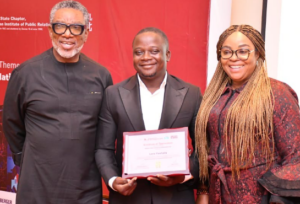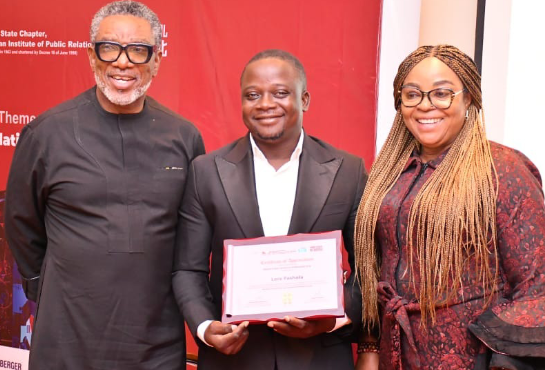By Lere Fashola, ESQ
In the realm of justice, Lere Fashola delves into the profound role of judges, transcending the symbolism of Themis. He highlights the judiciary’s duty in upholding the rule of law and protecting citizens’ rights, emphasizing its pivotal role in ensuring justice. As Nigeria continues to face the ripples of the last 2023 elections, Fashola urges the judiciary to maintain integrity and deliver justice free from political pressures. In this pivotal moment, the destiny of the nation hinges on the judiciary’s fearless commitment to a just and prosperous future.
A thoughtful examination of the revered symbol of justice underscores the immense responsibility vested in a judge when it comes to dispensing justice. Themis, the elegant, blindfolded goddess, bearing a sword in her right hand and a scale in her left, presents a profound challenge. Opting for a female figure over a male is not without significance; it underlines qualities such as gentleness, noble character, regal presence, virtuous disposition, mild temperament, affectionate love, and dependability in motherhood and fidelity in marriage. However, these attributes are rendered neutral by the blindfold. The blindfold carries great significance. It signifies that justice must embody not only the ladylike attributes but must be unequivocally impartial and unbiased. The sword she wields, of course, exerts its force when it falls, and the manner of its descent must not be arbitrary or capricious; it must be governed by the equilibrium of the scale. In legal terminology, this is known as the “weight or preponderance of evidence” in civil matters or “beyond reasonable doubt” in criminal cases.
Late Justice Chukwudifu Oputa Rtd. of the Supreme Court of Nigeria, in the case of Fawehinmi v. Akilu (2002) 7 NWLR (Pt. 769) 527 at 689, aptly observed: “The way Themis maintains the balance of the scale, regardless of individual factors, underscores the essence of true justice. Therefore, judges are consistently advised to remain devoid of sentiment in the execution of their judicial duties.”
Lady Hale, former President of the Supreme Court of the United Kingdom, eloquently captured the essence of justice in the following quote: “Justice is the foundation of a just society. It is the bedrock of democracy and the rule of law. It is the glue that holds society together.”
Lord Bingham of Cornhill, former Lord Chief Justice of England and Wales, further emphasized this all-important role of judges in upholding justice: “The role of the judge is to uphold the rule of law, to protect the rights of the individual, and to ensure that justice is done. This is a vital role in any society, but it is particularly important in a democracy. The rule of law is the foundation of democracy, and the judiciary is its guardian.”
Lord Denning, former Master of the Rolls, highlighted the importance of the judiciary in protecting liberty: “The law is the guardian of our liberty, and the judge is the guardian of the law.”

at the Lagos Digital PR SUmmit heald recently in Lagos
The Role of Judges in Nation Building
The judiciary plays a pivotal role in nation-building, the economy, and national security. By upholding the rule of law and protecting the rights of all citizens, the judiciary helps create a stable and prosperous society in which people can feel safe and secure.
Aristotle, with great dialectical acumen, also pointed out that a universal standard for addressing the consequences of actions and objects should be measured against an objective standard when regulating legal relationships in society. Punishment should correct crime, reparation should address civil wrongs, and damages should restore wrongful gains. Various scholars and philosophers, such as Kant, Hegel, John Stuart Mill, and François Geny, have significantly contributed their diverse views to elucidate the intricate concept of justice.
While judicial systems around the world establish ideal standards for governing human conduct in modern society, differences in culture, religion, politics, economics, social norms, and practices tend to complicate the concept of justice. It is often said that justice, like morality, is influenced by geography. For instance, a convicted drug trafficker in the United States of America or the United Kingdom may face several years in prison, while in other parts of the world, the penalty could be much more severe. This divergence was evident in the disparate verdicts given to two Nigerians arrested for drug trafficking. Tochi, a young teenage boy, was executed in Singapore for drug trafficking, whereas Wunmi Hassan, a well-known Yoruba actress, received a jail sentence of six months with an option of a one-million-naira fine in Nigeria.
As Justice Olasumbo Goodluck of the Court of Appeal pointed out in her lecture titled “The Judiciary As A Pivot for Good Governance” (2021) National Judicial Institute: “Even within the same jurisdiction, differing convictions for different classes of individuals are not uncommon. While a destitute individual convicted of stealing a paltry sum like N50 may face the full weight of the law, a former Governor convicted of financial crimes and money laundering may be allowed to return only a portion of his ill-gotten gains and receive a milder penalty under the new practice of ‘plea bargaining’ or ‘soft landing.’ Thus, the sentences for the impoverished are gradually diverging from those of the affluent, echoing George Orwell’s assertion in ‘Animal Farm’ that ‘all animals are equal, but some are more equal than others.”
Nevertheless, despite the disparities within various judicial systems worldwide, each system consistently strives to achieve the established ideals of justice. The concept of justice has evolved over the centuries. As humanity progresses beyond its primitive state, its understanding of right and wrong evolves, leading to a shift in favor of those with criminal tendencies in some modern, decadent societies. Concepts like suspended sentences and plea bargaining are introduced, while other countries and regions adhere to legal systems such as Sharia, which impose stringent penalties for crimes. Regardless of the system adopted, judges play a pivotal role in administering justice.
Late Justice Chukwudifu Oputa Rtd., in the same case of Fawehinmi v. Akilu, further stated: “Judges must be fearless and independent in the discharge of their duties. They must be prepared to stand up to the executive and legislative branches of government, even in the face of threats and intimidation. The judiciary is the last line of defense against tyranny and oppression. Judges must be prepared to protect the constitution with all that they’ve got.”
The Crucial Moment for the Judiciary
The 2023 Nigerian elections have presented a multitude of challenges to the judiciary. The political manipulation of the electoral system has resulted in numerous legal disputes, and this burden of resolving political disputes and upholding justice now falls on the shoulders of the judiciary. The emotional involvement of senior lawyers and the overzealous pursuit of their clients’ cases have, at times, overshadowed their responsibility to the legal profession and the broader justice sector. The media shows and the several TV interviews coupled with utterances of some Senior Advocates of Nigeria who presently occupy one or two public or political party affiliated offices but who are always too quick to share their political bias disguised as legal opinion in a case pending before the court of justice has now mounted heavy pressure on the expectations of the society from the judiciary. The integrity of the judiciary is at stake as it faces growing expectations and scrutiny in delivering fair and impartial judgments in the election petitions.
Late Justice Mohammed Bello Rtd. Then of the Supreme Court of Nigeria, in the case of A.G. Federation v. Abubakar (2007) 10 NWLR (Pt. 1025) 523 at 591, admonished the judiciary as follows: “The judiciary is the backbone of any democracy. It is the institution that ensures that the rule of law is upheld and that the rights of all citizens are protected. Without an independent and impartial judiciary, no nation can truly develop.”
The judiciary’s role in the aftermath of the 2023 elections is highly significant, with the destiny of the country hinging on the judgments to be delivered. The alleged inadequacies of the electoral process have placed immense pressure on the judiciary, as it must ensure that justice is served and that malfeasances do not go unpunished. The need for a credible and independent judiciary that delivers substantial justice has never been more critical, as the judicial system is called upon to resolve disputes arising from a contentious election.
Late Justice Chukwudifu Oputa Rtd. of the Supreme Court of Nigeria, in the case of Fawehinmi v. Akilu (2002) 7 NWLR (Pt. 769) 527 at 689, aptly observed: “Bad judgments can have a devastating impact on the economy and poverty reduction. They can discourage investment, undermine market confidence, and lead to increased corruption. Bad judgments can also erode public trust in the judiciary, which is essential for a stable and functioning democracy.”
The judiciary is being closely watched, and the decisions made in these cases will have far-reaching implications for the future of the country. As the public eagerly awaits the outcomes of these election petitions, the judiciary is urged to maintain its integrity and deliver justice according to the law, irrespective of political pressures or expectations.
Late Justice Kayode Eso Rtd., in the case of Adegbenro v. Adegbenro (1979) 5 NCLR 429 at 451, further stated: “The judiciary is the guardian of the constitution and the protector of the fundamental rights of citizens. It is the institution that ensures that the government does not overstep its bounds and that the people are not oppressed. The judiciary plays a vital role in nation building by promoting justice, equality, and fairness.”
The judiciary has a unique opportunity to shape the destiny of Nigeria through its judgments in the aftermath of the 2023 elections. By upholding the rule of law and delivering justice without fear or favor, the judiciary can help to strengthen democracy, promote economic growth, and reduce poverty in Nigeria.
Conclusion
The judiciary plays a pivotal role in nation-building. It is the custodian of the constitution and the protector of the fundamental rights of citizens. The judiciary is also responsible for upholding the rule of law and ensuring that justice is served to all.
The 2023 Nigerian elections have presented a multitude of challenges to the judiciary. However, the judiciary has a unique opportunity to shape the destiny of Nigeria through its judgments in the aftermath of the elections. By upholding the rule of law and delivering justice without fear or favor, the judiciary can help to strengthen democracy, promote economic growth, and reduce poverty in Nigeria.
The judiciary is urged to maintain its integrity and deliver justice according to the law, irrespective of political pressures or expectations. The future of Nigeria depends on it.
Dear readers, we really need your support to keep on serving you with authoritative, truthful, and juicy stories everyday. For your support, please reach out to the editor @gavelinternational66@gmail.com

